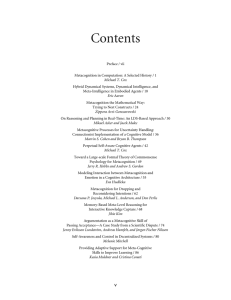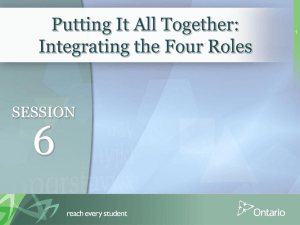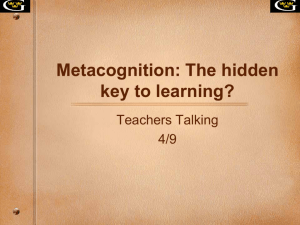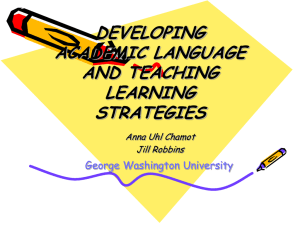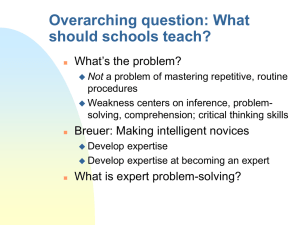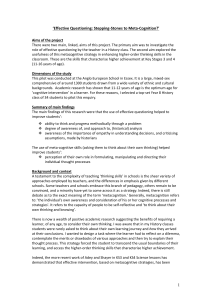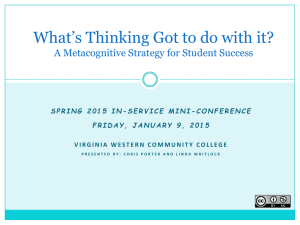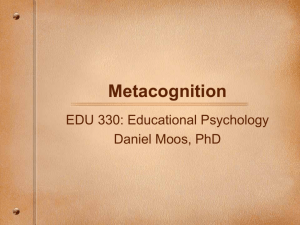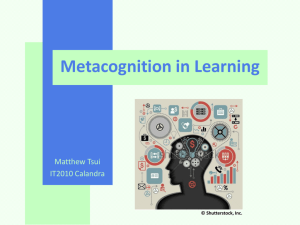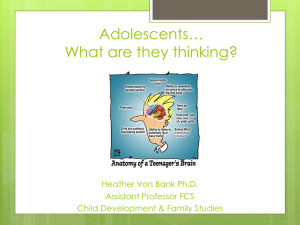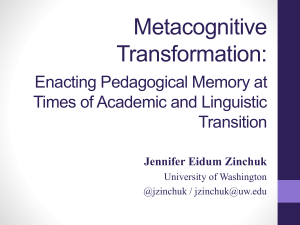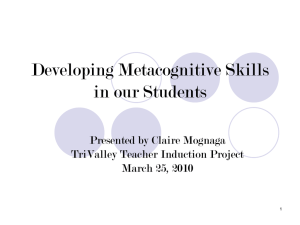Manuscript 3 metacognition and problem solving in CSCL
advertisement
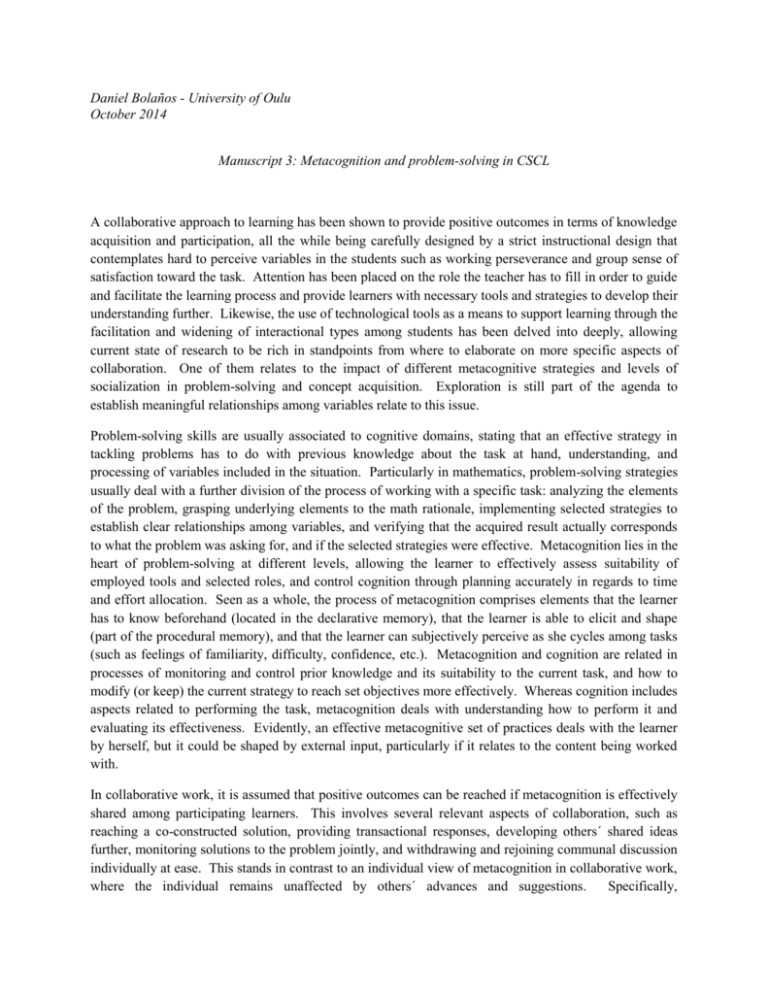
Daniel Bolaños - University of Oulu October 2014 Manuscript 3: Metacognition and problem-solving in CSCL A collaborative approach to learning has been shown to provide positive outcomes in terms of knowledge acquisition and participation, all the while being carefully designed by a strict instructional design that contemplates hard to perceive variables in the students such as working perseverance and group sense of satisfaction toward the task. Attention has been placed on the role the teacher has to fill in order to guide and facilitate the learning process and provide learners with necessary tools and strategies to develop their understanding further. Likewise, the use of technological tools as a means to support learning through the facilitation and widening of interactional types among students has been delved into deeply, allowing current state of research to be rich in standpoints from where to elaborate on more specific aspects of collaboration. One of them relates to the impact of different metacognitive strategies and levels of socialization in problem-solving and concept acquisition. Exploration is still part of the agenda to establish meaningful relationships among variables relate to this issue. Problem-solving skills are usually associated to cognitive domains, stating that an effective strategy in tackling problems has to do with previous knowledge about the task at hand, understanding, and processing of variables included in the situation. Particularly in mathematics, problem-solving strategies usually deal with a further division of the process of working with a specific task: analyzing the elements of the problem, grasping underlying elements to the math rationale, implementing selected strategies to establish clear relationships among variables, and verifying that the acquired result actually corresponds to what the problem was asking for, and if the selected strategies were effective. Metacognition lies in the heart of problem-solving at different levels, allowing the learner to effectively assess suitability of employed tools and selected roles, and control cognition through planning accurately in regards to time and effort allocation. Seen as a whole, the process of metacognition comprises elements that the learner has to know beforehand (located in the declarative memory), that the learner is able to elicit and shape (part of the procedural memory), and that the learner can subjectively perceive as she cycles among tasks (such as feelings of familiarity, difficulty, confidence, etc.). Metacognition and cognition are related in processes of monitoring and control prior knowledge and its suitability to the current task, and how to modify (or keep) the current strategy to reach set objectives more effectively. Whereas cognition includes aspects related to performing the task, metacognition deals with understanding how to perform it and evaluating its effectiveness. Evidently, an effective metacognitive set of practices deals with the learner by herself, but it could be shaped by external input, particularly if it relates to the content being worked with. In collaborative work, it is assumed that positive outcomes can be reached if metacognition is effectively shared among participating learners. This involves several relevant aspects of collaboration, such as reaching a co-constructed solution, providing transactional responses, developing others´ shared ideas further, monitoring solutions to the problem jointly, and withdrawing and rejoining communal discussion individually at ease. This stands in contrast to an individual view of metacognition in collaborative work, where the individual remains unaffected by others´ advances and suggestions. Specifically, metacognition at a group level requires from the participants the creation of a shared goal on which to monitor the team´s cognitive activity. Further, it needs to be updated constantly through effective collaborative monitoring, depending on the depth and progress of understanding and solving the problem at hand. The article reviewed pertains to establishing a parallel between socially shared metacognition and individual perception of difficulty upon solving mathematical problems. In particular, importance is given to how socially-shared metacognition can be effective toward decreasing individual perception of difficulty when it aims to steer the discussion about how to tackle and solve the problem, rather than just exchanging ideas about how to solve it. Effective metacognitive regulatory messages should relate to earlier discussion done on the subject, should have the intention of promoting or changing problemsolving processes, and should be explicit in providing reasons for it. Messages were analyzed according to their nature, and individual metacognition and its communal effects were studied through them. A visible conclusion is the importance of making thinking visible by the learners, by wording explanations clearly and acknowledging relevant ideas and questions. Likewise, making feelings visible is also important for reassuring others and providing reasons to "feeling on the right track" in regards to solving the problem. It is interesting to point out how an effective interaction among the group members in regard to sociallyshared metacognition depends on previous knowledge on the task at hand. Whereas there can be at least one member that has knowledge enough about the domain, and is capable of steering her peers via metacognitively regulating comments, if there are no members with knowledge enough from before, or there is no logic of group support with individual metacognitive efforts, there will be no decreasing in feeling of difficulty. A question arises here: doesn´t the none-realization of the lack of previous knowledge already constitute a lack of effective metacognitive skills? And in parallel to this, and drawing from Vygotsky´s theory of the zone of proximal development, it would be perhaps useful to arrange groups in such a way that participants have similar levels of understanding of the knowledge domain and effective metacognitive strategies. This way, observed variations in perceived degrees of difficulty would not be affected by varying levels of prior knowledge and metacognitive skills. A relevant exploratory study, it opens further research possibilities to broaden on a topic already regarded as relevant in the field. Hurme, T-R., Merenluoto, K., & Järvelä, S. (2009). Socially shared metacognition of pre-service primary teachers in a computer-sùpported mathematics course and their feelings of task difficulty: a case study. Educational Research and Evaluation, 15(5), 503-524. Video by Tarja-Riita Hurme
